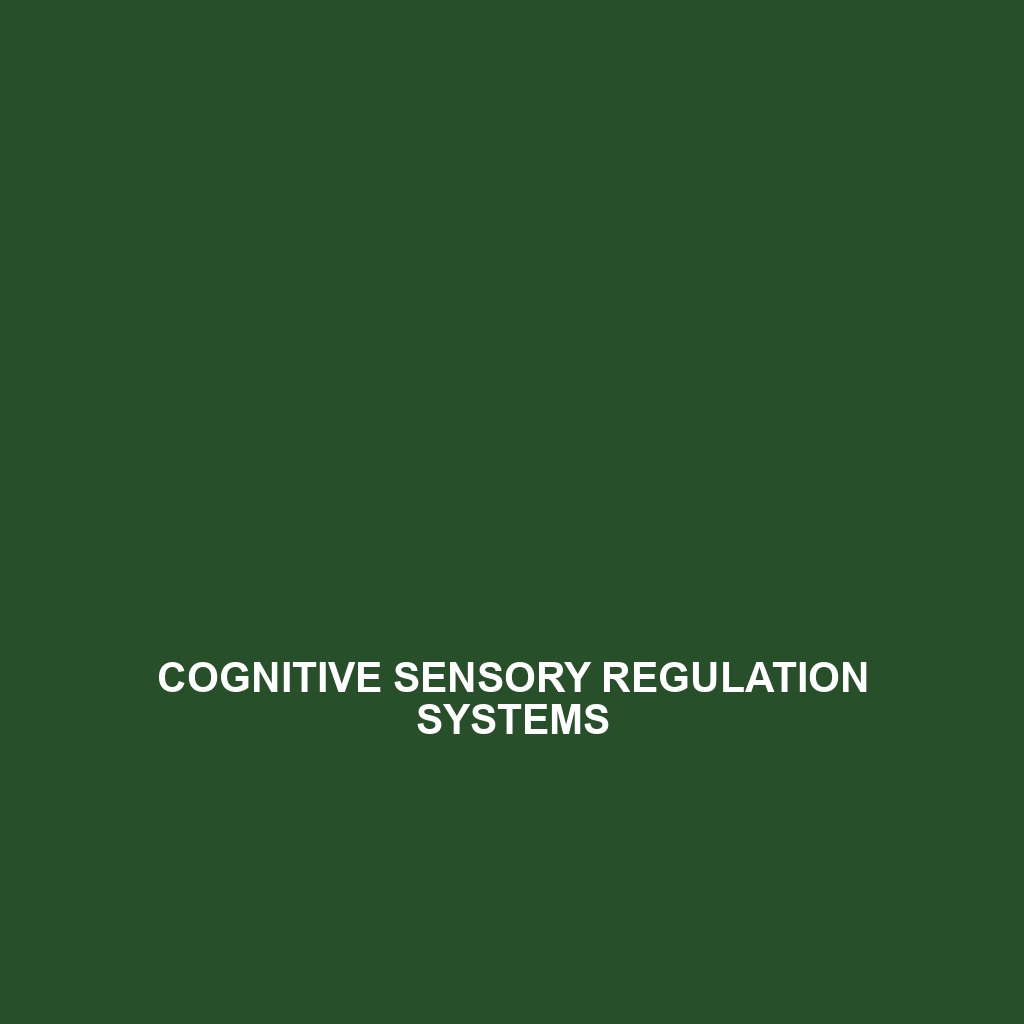Cognitive Sensory Regulation Systems: Transforming Mental Health Care
Overview
Cognitive Sensory Regulation Systems (CSRS) represents an innovative approach to mental health care, focusing on the integration of cognitive-behavioral techniques with sensory regulation to enhance emotional well-being. The service is designed to assist individuals coping with a range of mental health challenges, including anxiety, depression, sensory processing disorders, and trauma. By targeting the connection between sensory input and emotional responses, CSRS provides a comprehensive framework to improve mental health outcomes and encourage positive behavioral changes.
This multifaceted service approach is built on the understanding that our environment significantly impacts our mental state. By utilizing tailored sensory experiences alongside cognitive strategies, CSRS aims to create a balanced and harmonious mental environment conducive to healing and personal growth. It caters to clients of all ages, providing individualized support that combines empathy, expertise, and practical techniques to foster resilience and emotional stability.
How It Works
The operation of Cognitive Sensory Regulation Systems hinges on a unique, structured methodology that combines sensory integration therapy with cognitive regulation strategies. The process generally consists of the following key practices:
- Assessment: Each client begins their journey with a comprehensive assessment conducted by trained mental health professionals. This evaluation identifies sensory preferences, triggers, and cognitive patterns relevant to the individual’s emotional landscape.
- Customized Sensory Regimens: Based on the assessment, practitioners design personalized sensory experiences using various modalities—such as sound, touch, light, and olfactory stimuli—tailored to the client’s specific needs and sensitivities.
- Cognitive Behavioral Integration: The service integrates cognitive-behavioral therapy (CBT) techniques with sensory experiences. Clients learn to identify and challenge negative thought patterns while using sensory tools to regulate their emotional responses.
- Skill Development: Clients engage in practical exercises aimed at enhancing coping skills and emotional resilience. This includes mindfulness practices, relaxation techniques, and sensory-based self-soothing methods.
- Continuous Support and Evaluation: The service emphasizes ongoing support, with regular check-ins and adjustments to the sensory regimens based on progress and feedback. This dynamic approach ensures that clients receive effective, adaptive care over time.
Benefits
- Enhanced Emotional Regulation: Teach clients how to manage their emotional responses effectively, providing them with tools to navigate daily stressors.
- Improved Sensory Processing: Help individuals better understand and manage their sensory sensitivities, reducing overwhelm and increasing comfort in various environments.
- Holistic Approach: Provide a comprehensive mental health service that addresses both cognitive and sensory aspects of well-being.
- Personalized Care: Tailor sessions to each individual, ensuring relevance and effectiveness in addressing specific challenges.
- Empowerment: Foster a sense of agency in clients, equipping them with skills and strategies to advocate for their mental health needs.
- Accessible to All: Create a welcoming environment where individuals from all walks of life can access expert mental health services.
Who It’s For
Cognitive Sensory Regulation Systems is designed for a diverse audience, addressing the needs of various populations experiencing mental health challenges. Specific groups that may particularly benefit from this service include:
- Children and Adolescents: Young individuals who experience sensory processing disorders, ADHD, or anxiety can gain invaluable skills to manage their emotions and reactions.
- Adults with Anxiety and Mood Disorders: Those struggling with anxiety, depression, or mood regulation issues can find tailored strategies to enhance emotional well-being.
- Individuals with Autism Spectrum Disorder (ASD): Adults and children on the autism spectrum often deal with sensory sensitivities; CSRS helps them navigate these challenges.
- Trauma Survivors: Individuals who have experienced traumatic events can benefit from the calming and grounding techniques offered through sensory regulation.
- Caregivers and Families: Family members seeking to understand and support their loved ones can access resources and learn strategies to create nurturing environments.
Special Features
Cognitive Sensory Regulation Systems distinguishes itself from conventional mental health services through several unique features:
- Interdisciplinary Approach: Combining principles from psychology, occupational therapy, and sensory integration science ensures comprehensive care that addresses multiple facets of mental health.
- Personalized Sensory Profiles: Clients receive a detailed sensory profile that outlines their preferences and aversions, allowing for a tailored experience that minimizes discomfort and maximizes effectiveness.
- Innovative Technology Utilization: Incorporating cutting-edge technology, such as virtual reality and biofeedback tools, enhances sensory experiences and provides real-time feedback for emotional regulation.
- Community Engagement: CSRS encourages community involvement through group sessions and family workshops, fostering a supportive network for clients and their loved ones.
- Ongoing Research Commitment: The service is committed to staying ahead of trends and best practices by conducting ongoing research and integrating new findings into its methodology.
Why Choose This Service
Choosing Cognitive Sensory Regulation Systems brings unparalleled value to individuals seeking support for their mental health challenges. With its unique blend of cognitive and sensory approaches, CSRS empowers clients to take charge of their emotional well-being. The service not only addresses immediate mental health needs but also equips clients with lifelong coping mechanisms and resilience strategies.
By prioritizing personalized care and community support, CSRS fosters an environment where clients feel understood, validated, and empowered to thrive. Whether seeking help for themselves or loved ones, individuals can trust that CSRS is dedicated to guiding them on their journey toward improved mental health and overall life satisfaction. Take the courageous step to enhance your mental well-being; Cognitive Sensory Regulation Systems is here to help you every step of the way.
